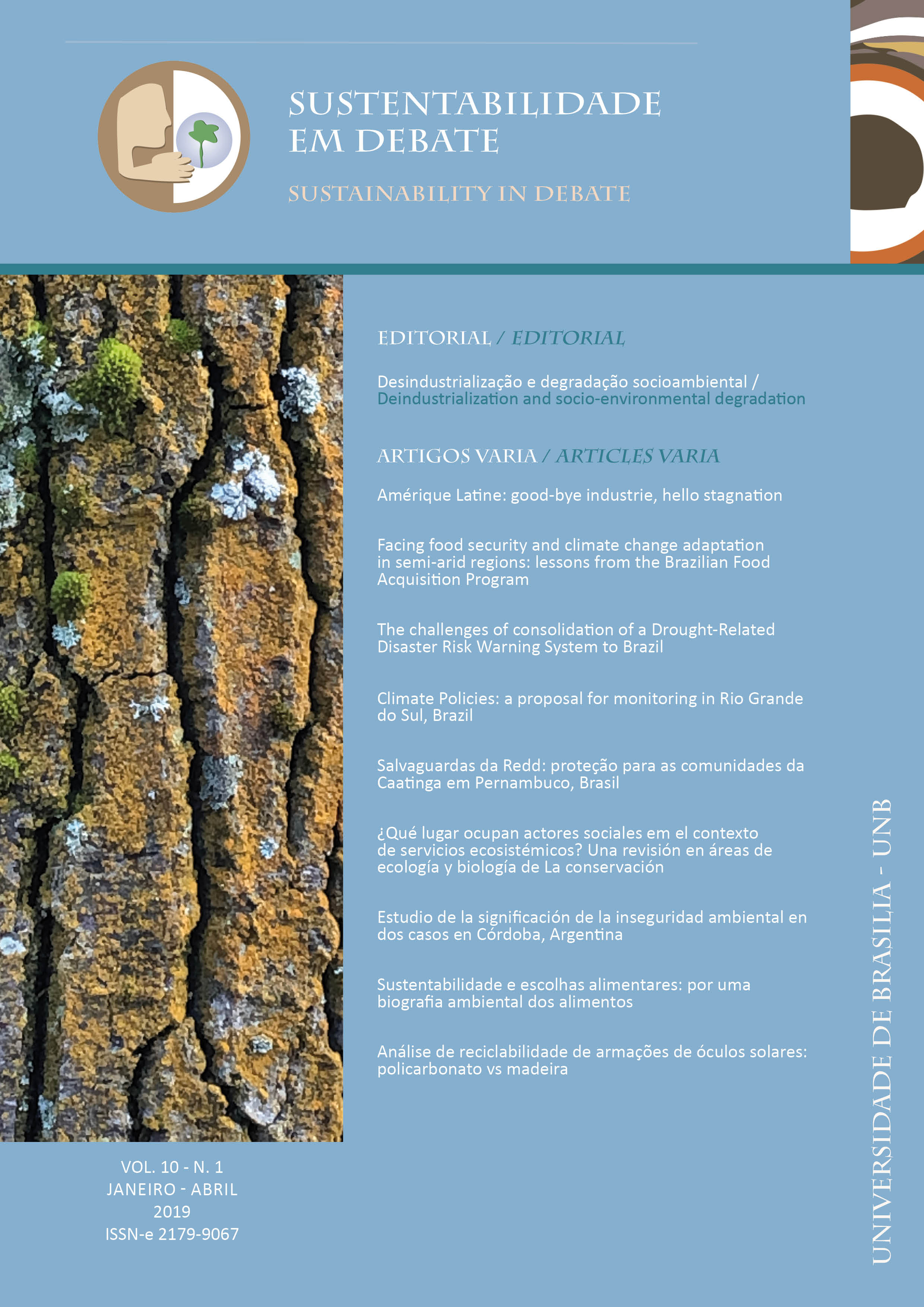Salvaguardas da Redd: proteção para as comunidades da Caatinga em Pernambuco, Brasil
DOI:
https://doi.org/10.18472/SustDeb.v10n1.2019.18927Palabras clave:
Lei Estadual nº 15.809/2016; RSS Framework; Salvaguardas na Redd.Resumen
A Redução do Desmatamento e da Degradação Florestal (Redd) é um instrumento jurídico criado pelas Nações Unidas para combater o desmatamento dos remanescentes florestais nativos. Para sua plena efetividade, faz-se necessário o cumprimento de salvaguardas que possuem como objetivo proteger as comunidades receptoras dos projetos de conservação. Apesar da lacuna legal na esfera federal, Pernambuco disciplinou o instrumento na Lei Estadual nº 15.809/2016, traçando seus próprios critérios de implementação. O interesse na efetivação deve-se ao intenso processo de degradação do seu bioma predominante: a Caatinga. O bioma possui apenas 50% da sua cobertura vegetal original. Assim, o presente estudo buscou examinar as salvaguardas propostas para implementação da Redd na Caatinga de Pernambuco. Para tanto, as salvaguardas foram examinadas com base na metodologia Redd Safeguard Spectrum Framework (RSS Framework). Os resultados demonstram que as salvaguardas definidas possuem, em grande parte, um caráter abstrato, baseado em princípios gerais, dificultando seu monitoramento e aplicação.
Descargas
Descargas
Publicado
Cómo citar
Número
Sección
Licencia
Derechos de autor 2019 Sustentabilidade em Debate

Esta obra está bajo una licencia internacional Creative Commons Atribución-NoComercial-SinDerivadas 4.0.
La presentación de la(s) obra(s) científica(s) original(es) por parte de los autores, como titulares de los derechos de autor de los textos enviados a la revista, de conformidad con la Ley 9.610/98, implica la cesión de derechos de autor de publicaciones impresas y/o digitales a la Revista de Sustenibilidad en Debate de los artículos aprobados para fines de publicación, en un único número de la Revista, autorizando también que la(s) obra(s) científica(s) aprobada(s) se divulguen de forma gratuita, sin ningún tipo de reembolso de derechos de autor, a través del sitio web de a Revista, para leer, imprimir y/o descargar el archivo de texto, a partir de la fecha de aceptación para publicación. Por lo tanto, los autores, al presentar los artículos a la Revista y, en consecuencia, la libre cesión de derechos de autor relacionados con el trabajo científico presentado, son plenamente conscientes de que no serán remunerados por la publicación de los artículos en la revista.Â
La Revista está licenciada bajo una licencia no comercial y sin derivaciones Creative Commons (No permite la realización de obras derivadas) 3.0 Brasil, con el propósito de difundir conocimientos científicos, como se indica en el sitio web de la publicación, que permite el intercambio del texto y el reconocimiento de su autoría y publicación original en esta revista.
Los autores pueden asumir contratos adicionales por separado, para la distribución no exclusiva de las obras publicadas en la revista Sustenibilidad en Debate (por ejemplo, en un capítulo de libro), siempre que se indique que los textos se publicaron originalmente en esta revista y que se menciona el DOI correspondiente. Se permite y incentiva a los autores a publicar y distribuir su texto online después de su publicación (por ejemplo, en repositorios institucionales o en sus páginas personales).Â
Los autores aceptan expresamente los términos de esta Declaración de Derechos de Autor, que se aplicará a la presentación si es publicada por esta Revista.









